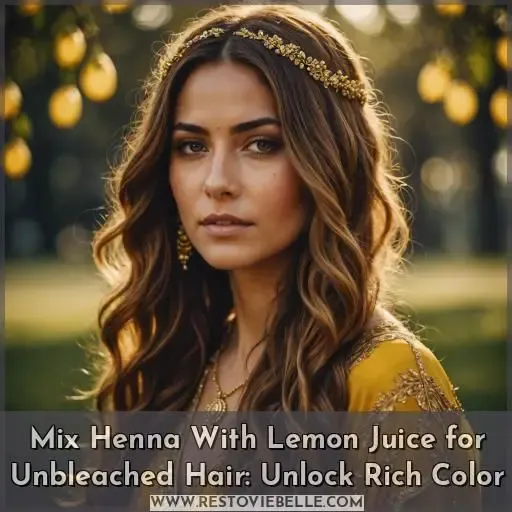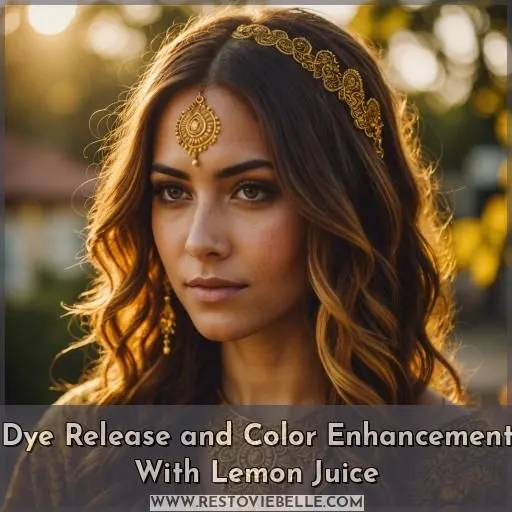This site is supported by our readers. We may earn a commission, at no cost to you, if you purchase through links.

To achieve vibrant color on your unbleached tresses, blend henna powder with lemon juice. The lemon juice slows the dye’s release, intensifies the hue, and intensifies curls, while also preserving scalp health and conditioning your hair.
However, be aware that the acidity in lemon juice can potentially lead to hair breakage, so be sure to dilute it with water.
For optimal results, use high-quality henna powder to guarantee a consistent paste texture, and consider using an indigo glaze or conditioning treatment to protect your hair’s well-being.
With some experimentation, you can discover the ideal henna and lemon juice mixture to achieve your desired look while maintaining the health of your hair.
Table Of Contents
- Key Takeaways
- Mixing Henna With Lemon Juice for Unbleached Hair
- Benefits of Using Lemon Juice in Henna Mixtures
- Dye Release and Color Enhancement With Lemon Juice
- Drawbacks and Alternatives to Lemon Juice in Henna
- Personal Preferences and Experimentation With Lemon Juice in Henna
- Frequently Asked Questions (FAQs)
- Conclusion
Key Takeaways
- Lemon juice enhances the color intensity of henna, making it a popular choice for achieving vibrant hues on unbleached hair.
- The acidity of lemon juice can potentially lead to hair breakage, so it’s recommended to dilute it with water to mitigate this risk.
- Mixing henna with lemon juice requires careful experimentation to find the right balance that works for your hair type and desired color outcome.
- Alternatives to lemon juice, such as purified water, rose water, or herbal teas, can be used to mix with henna for those seeking gentler options.
Mixing Henna With Lemon Juice for Unbleached Hair
To mix henna with lemon juice for unbleached hair, follow these steps:
- Start with a henna powder of your choice, such as Rajastani or Jamila, depending on your desired color.
- Add 2 tablespoons of essential oil, like lavender, eucalyptus, tea tree, or cajeput, to the henna powder.
- Add 1/4 cup of sugar to the mixture.
- Gradually add 3/4 cup of purified water to the henna powder, ensuring a thick mashed potato-like consistency.
- Add a few drops of lemon juice to the mixture for a vibrant, richer color.
- Mix the ingredients thoroughly, using a whisk or spoon.
Benefits of Using Lemon Juice in Henna Mixtures
Curious about the benefits of using lemon juice in your henna mixtures? You’ll be pleased to know that lemon juice can both delay the henna dye release and potentially enhance the resulting color. However, it’s important to be mindful of the potential for increased hair breakage when using lemon juice.
Henna and Lemon Juice Mixture
Mixing Henna With Lemon Juice for Unbleached Hair
Lemon juice is a popular ingredient in henna paste, and for good reason. It has several benefits that can enhance the color and application of henna. Here’s a breakdown of how lemon juice can be used in your henna mixture:
- Acidity: Lemon juice is acidic, which can help break down the henna paste and release more dye. This can result in a richer, more vibrant color.
- Curl Activation: The acidity in lemon juice can also help activate curls, making them more defined and visible.
- Scalp Health: The anti-fungal properties of lemon juice can keep your scalp healthy, which is important for maintaining a healthy head of hair.
- Henna Storage: Adding lemon juice to your henna paste can help preserve it, allowing you to store it for longer periods without it drying out or losing its potency.
- Hair Texture: Lemon juice can help condition your hair, making it feel softer and more manageable.
- Personal Preferences: Some people prefer the look and feel of henna mixed with lemon juice, as it can give the hair a natural, dimensional color.
However, it’s vitally important to remember that using lemon juice in your henna mixture can also have some drawbacks:
- Drying Effect: Lemon juice is drying, which can cause hair breakage if not used in moderation.
- Delayed Dye Release: Lemon juice can slow down the dye release, which means you’ll need to leave the henna on for a longer time to achieve the desired color.
To get the best of both worlds, you can experiment with different ratios of lemon juice and water in your henna mixture. Start with a small amount of lemon juice and gradually increase it until you find the balance that works best for your hair type and desired color outcome. Remember, everyone’s hair is unique, so what works for one person mightn’t work for another. The key is to find what works best for you and your hair.
Dye Release Delay
When using henna for hair color, the addition of lemon juice can delay dye release and enhance the color of the henna. However, it can also be drying and cause hair breakage. If you choose to use lemon juice, it’s recommended to dilute it with water to reduce itching and to use it in combination with other liquids like distilled water or coffee.
For body art, lemon juice can also be used, but it may cause itching and slow down dye release. Diluting it with water or adding rose water can help reduce itching.
Personal preferences and experimentation are encouraged when finding the best results for using lemon juice in henna.
Hair Breakage and Conditioning
While lemon juice’s acidity can be a double-edged sword, it’s all about balance:
- Lemon juice acidity facilitates dye release time, yielding more vibrant hair color.
- Premium henna powder guarantees a uniform paste texture.
- Indigo glaze and conditioning treatment safeguard hair integrity.
- Attain medium brown curls without jeopardizing hair health.
Dye Release and Color Enhancement With Lemon Juice
Lemon juice can enhance the color intensity of your henna dye, making your hair look rich and vibrant. It can also help prevent hair breakage and condition your hair, leaving it healthy and shiny. However, using lemon juice can delay dye release, so it’s imperative to plan accordingly.
If you’re environmentally conscious, using lemon juice with your henna is an eco-friendly choice, as it’s a natural product.
To get the best results, mix henna with lemon juice for unbleached hair and revel in the benefits of rich color and healthy hair.
Drawbacks and Alternatives to Lemon Juice in Henna
While lemon juice can enhance the color of your henna, it also comes with its own set of drawbacks. Here are three things to think about:
- Acidic Properties: Lemon juice is acidic, which can cause drying and lead to hair breakage. This may not be suitable for those with delicate hair or those seeking to minimize damage.
- Dye Release Delay: Lemon juice can slow down the dye release process, which may not be desirable for those seeking immediate color change.
- Itching and Preservation: Lemon juice can cause itching and may preserve the henna paste, which can be a disadvantage for those looking for a smoother application process.
If you’re looking for an alternative, consider using water. It’s mild and gentle, releases dye effectively, and can be used in combination with other liquids to achieve your desired results.
Personal Preferences and Experimentation With Lemon Juice in Henna
Experimenting with lemon juice in your henna mixture can be a fun and rewarding process. While it may cause hair breakage and delay dye release, some people find that it enhances the color of their hair. Personal preferences play a big role in this decision.
If you’re looking for a more natural look, you might prefer the drying effect of lemon juice. On the other hand, if you want a more vibrant color, you might opt for water as your primary liquid.
The key is to find what works best for you and your hair. Don’t be afraid to try different combinations and see what you like best.
Frequently Asked Questions (FAQs)
What is the recommended liquid for mixing henna with lemon juice?
I hear your concern about lemon juice – it can be drying. But don’t worry, you’ve got options! For henna, using a combo of water and lemon juice is ideal. The water keeps things gentle while the lemon juice enhances the color. Give it a try and let me know how it turns out!
How does lemon juice affect the dye release time of henna?
Lemon juice delays henna’s dye release, extending the time it takes for the color to fully develop. This can range from 12-24 hours for Rajastani henna, and 24-48 hours for Jamila. Warm temperatures accelerate the process.
What are the alternatives to using lemon juice in henna mixtures?
Instead of lemon juice, you can use purified water, rose water, or herbal teas to mix with henna. These gentler liquids won’t dry out your hair and will effectively release the dye. Experiment to find your perfect blend!
Can lemon juice be used in henna body art?
Lemon juice can be used in henna body art, but it may cause itching. Diluting it with water can reduce this effect. For a gentler approach, opt for water as the primary liquid to accelerate dye release.
How can I achieve different colors with henna and lemon juice?
Mix henna with lemon juice and watch your locks transform – from vibrant reds to rich browns. Experiment, and express nature’s artistic flair on your hair. The world is your canvas, so paint it!
Conclusion
Ultimately, by combining henna with lemon juice, you’ll unveil a vibrant color transformation for your unbleached tresses. The lemon juice’s acidity enhances the hue while decelerating the dye’s release, guaranteeing a stunning outcome.
Just be aware of potential hair breakage and dilute the lemon juice as necessary. With some experimentation, you’ll find the ideal henna and lemon juice blend to achieve your desired look without sacrificing your hair’s well-being.











